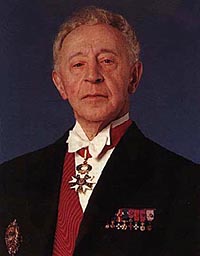
Born: January 28, 1887, Lodz, Russian partition of Poland (presently Poland)
Died: December 20, 1982 in Geneva, Switzerland
Summary. He was widely considered as one of the greatest piano virtuosos of the 20th Century. He received international acclaim for his performances of Chopin and Brahms and his championing of Spanish music.
An incident. As the new Museum’s of the History of Polish Jews deputy director, Ewa Junczyk-Ziomecka, tells it, in 1945, Rubinstein was invited to play at the San Francisco Opera House for diplomats who had gathered from around the world to sign the United Nations charter. Rubinstein was so upset to see that the Polish red and white flag was not among the banners hanging in the great hall, that his first reaction was to say that he would not play. His wife convinced him to take the stage. "I don't see my country, Poland," Rubinstein said, motioning toward the flags. So before he began the concert, he played the Polish national anthem and asked the audience to stand..."
Early days. Father,Ignacy Rubinstein was a merchant; mother Felicja nee Heyman.
Aside from his early and singular fascination with the piano, another interesting childhood trait is that Rubinstein didn't begin speaking until some time around the age of three. Until the time that he developed speech, Rubinstein would entertain his family by imitating non-speech sounds. Rubinstein studied in Warsaw. He made his debut in Berlin in 1900, followed by appearances in Germany and Poland and further study with Karl Heinrich Barth who was one of the most important pedagogues in Berlin. The teacher/pupil relationship could hardly be described as cordial. Barth attempted to lay down solid technical and intellectual principles for the young pianist, but Rubinstein rebelled against Barth's tough, Germanic discipline and was unwilling to submit to the boring but necessary technical work demanded. Despite their differences, the boy prospered and in 1899 began his professional career after a successful debut in the Great Hall of the Berlin Hochschule with the Berlin Philharmonic playing works by Mozart,Chopin and Schumann as well as Camille Saint-Saëns's Piano Concerto No. 2 in G. Amazed by Rubinstein's performance, one critic wrote: "He played everything, not as a child prodigy, but as a mature, adult musician. After six unhappy years with Barth, Rubinstein left Berlin in 1903 and returned to Poland. After studying with piano virtuoso Ignacy Paderewski, he went to Paris to further his studies.
Professional career. In Paris he met the composers Ravel, Dukas, and the violinist Thibaud. He also played Saint-Saëns' Piano Concerto No. 2 in the presence of the composer. Rubinstein made his New York debut at Carnegie Hall in 1906, and thereafter toured the United States, Austria, Italy, and Russia. In 1912, he made his London debut. During World War I Rubinstein lived mainly in London, accompanying the violinist Eugène Ysaÿe. From 1916 to 1917, he toured Spain and South America, developing an enthusiasm for the music of Granados, Albéniz, de Falla, and Villa-Lobos. In 1917 Rubinstein left Cádiz (Spain) with his music manager Ernesto De Quesada, on the Infanta Isabel to South America. He debuted on July 2, 1917 in the Teatro Odeon, in Buenos Aires. This tour included concerts in Montevideo (Uruguay), Santiago de Chile and Valparaíso. In 1932 he withdrew from concert life for several months to work on his technique and repertory. During World War II, Rubinstein lived in the United States and became a naturalized citizen in 1946. He refused to play in post-war Germany because of the Nazi extermination of members of his family. His return to Poland in 1958, after a 20-year absence, brought tears to the eyes of a Warsaw audience, and initiated the second unanimous ovation in Polish history (the first was for Paderewski). He retired from the stage in 1976, as his eyesight and hearing were rapidly deteriorating. He became almost blind in later life. Although best known as a recitalist and concerto soloist, Rubinstein was also considered an outstanding chamber musician, partnering with such luminaries as Henryk Szeryng, Jascha Heifetz, Gregor Piatigorsky, and the Guarneri Quartet. Of the piano solo repertoire Rubinstein recorded a vast portion, including nearly all the works of Chopin, save the Études, and innumerable other Romantic composers. He was one of the earliest champions of the afore-mentioned Spanish and South American composers and of French composers who, in the early 20th century, were still considered "modern". In addition, Rubinstein was the first champion of the music of his compatriot Karol Szymanowski. Rubinstein was fluent in eight languages. His photographic memory of much of the repertoire, not simply that of the piano, was formidable. According to his memoirs, the pianist learned Franck’s Symphonic Variations while on a train en route to the concert, without the benefit of a piano.
Marriages. Rubinstein was married in 1932 to Aniela (Nela) Mlynarska, daughter of conductor Emil Mlynarski and ex-wife of Mieczyslaw Munz. They had four children: their daughter Eva married William Sloane Coffin; their son John Rubinstein is an actor. Rubinstein also fathered a daughter with a South American woman. Though he never divorced, he carried on a series of affairs during his marriage and, in 1977 at age 90, left his wife for the young Annabelle Whitestone.
Honors and awards. 1974 and 1975, Grammy Award for Best Chamber Music Performance; 1976, Grammy Award for Best Instrumental Soloist Performance (with orchestra); 1977, honorary Knight of the British Empire (KBE); 1977, Grammy Award for Best Instrumental Soloist Performance (without orchestra); 1994, Grammy Lifetime Achievement Award; French Legion of Honor; American Medal of Freedom.
Source:
This article uses, among others, material from the Wikipedia article "Arthur Rubinstein" licensed under the GNU Free Documentation License. :
Wikipedia
with additions and modifications from:
The New York Sun (Rubinstein at the UN inauguration)
Abravanel
Malgorzata Kosinska
TIME magazine cover
Watch and listen Rubinstein playing Beethoven's piano concerto
Return to home page:
Prominent Poles